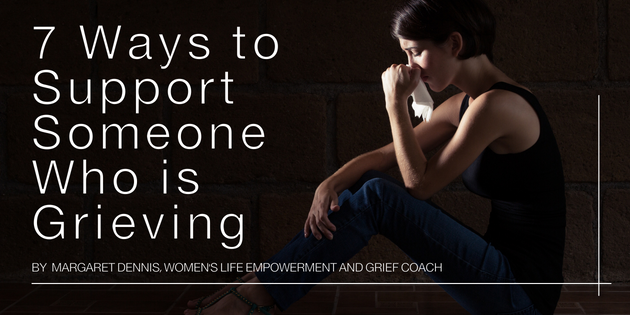
By Margaret Dennis, Women’s Life Empowerment & Grief Coach
Have you ever been in the depths of grief, and someone has said something really stupid, hurtful, or ridiculous to you?
Something that makes you shake your head and wonder what planet they came from?
Or they have shown up with a casserole?
I have.
Casseroles Don’t Heal Grief:
When my son died at 3 days old, many people reached out to offer their support…and bring me casseroles. With their well-meaning intentions, they would say “helpful” things to me like: “be brave”, “be strong”, and “at least he’s not suffering anymore”.
Not ONE of those well-meaning sentiments (or casseroles) helped me to feel any better. If anything, those words made me feel like I couldn’t truly express the deep, heart-wrenching sadness that I felt over the loss of my son – at least not publicly. The idea of having to be brave or strong, when all I really wanted to do was to completely fall apart, was a LOT of pressure. You see, our society doesn’t like it when we express our darkest emotions because it makes everyone around us uncomfortable. So, you put on your brave face, push down your emotions, and suffer your grief alone in silence. And IF you get hungry, you take out a fork and eat a casserole.
Our Protective Brain:
Because we don’t talk about grief, as a collective society we have no idea how to effectively support someone who is grieving. Without any external guidance, our reactions to grief are determined primarily by our primal brain. It perceives grief – both our own and other’s – as an emotional threat and is quick to push us into “flight” mode. The main message it sends us is to get away from the pain as quickly as possible, whether that is squashing it down and ignoring our pain or physically removing ourselves from the vicinity of someone who is grieving.
If we find ourselves in a situation where we are face to face with someone who is grieving, many of us get uncomfortable and we start saying and doing stupid things to help make US feel better. That is when we use words like “brave” or “strong” because those words are power words and our brains connect them with defeating the grief, therefore reducing its threat. If the person who is grieving can be brave and strong – and control their grief – then the grief can no longer affect us. As for the casseroles, our society often connects over food, so casseroles basically say: “I care about you, but I have no idea what to do to help you, so I made you something to eat to show I care”.
When it comes to supporting someone who is grieving in a way that is actually supportive, this protective brain of ours gets in the way. The key is to come prepared for battle.
7 Ways to Support Someone Who is Grieving:
When someone is grieving, they feel completely alone in their pain. And rightly so. No one can ever truly understand their pain, as their pain is always unique to them, just as yours is unique to you. The key to helping someone who is grieving is to allow them to feel the way that they feel, without judgement; not negate or dismiss their pain; and reassure them that they are not alone.
Here are seven things that you can do to support someone who is grieving:
- Let them know that you are sorry for their loss.
- Let them know that you are there for them, and then actually be there.
- Do NOT tell them to be brave or strong.
- Show empathy.
- Sit with them and give them the opportunity to express how they are feeling. Their grief is about them, not you.
- Hug them if they are open to it. This releases oxytocin and endorphins which stimulates positive feelings.
- Do not judge how they choose to grieve – everyone grieves in their own way.
Moving forward with grief takes courage. Talking about it takes more. Through my work as a Women’s Empowerment & Grief Coach, I help support women to take those steps forward and create their best life, while honouring their grief.
I invite you to connect with me on my website or on LinkedIn and watch my TEDx Talk on Grief.